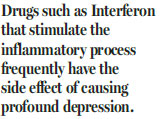Can Omega-3 oils, an anti-inflammatory, help fight depression?
In medicine, as in life, there is much to be gained from questioning the obvious with some imaginative lateral thinking. Thus, it is scarcely surprising that those with the misfortune to be afflicted with the muscular pains and swollen joints of rheumatoid arthritis should not infrequently become depressed, the severity of their symptoms compounded by gloomy thoughts, fatigue, insomnia and so on.
The cause of their low mood seems obvious enough, warranting treatment with antidepressants such as Prozac. But perhaps, speculated Professor Carmine Pariante of the Institute of Psychiatry, their depression is not primarily due to the stresses of coping with chronic ill health, but rather the inflammatory process responsible for the illness itself.
This might be difficult to prove, but is suggested by the observation that drugs such as Interferon that stimulate the inflammatory process frequently have the side effect of causing profound depression.
Interferon is the mainstay of the treatment of hepatitis C, and in a trial of 150 patients, published in the journal Biological Psychiatry, he reports that a two-week course of the anti-inflammatory omega-3 fatty acids - a major constituent of fish oil - did indeed dramatically reduce the likelihood of their subsequently developing depressive symptoms, by two thirds. "This nutritional intervention," he writes, "restores the natural anti-inflammatory capabilities of the body that protects against depression."
For those who might wish to know more, journalist and Telegraph contributor Rachel Kelly describes in her recently published The Happy Kitchen (Short Books) how the scientific insights of Prof Pariante and others into the influence of food on the workings of the mind have, together with the joys of cooking, aided her own recovery from severe depression.

Peculiar palpitations
This week's medical query comes courtesy of Mrs BF from Bristol, who is woken every morning around 6.30am with thumping palpitations that last around 15 minutes - though, more recently, they have started earlier and last longer. The usual tests - treadmill, ECG, 24-hour monitoring - have been uninformative, and her cardiologist advises her it is just her body 'waking up'. Her GP has suggested she take a mild tranquilliser, but any alternative explanations would be much appreciated.
The hypertension hype
My recent comments on the non-benefits of treating mild hypertension (see Professor Stephen Martin's BMJ article "Mild hypertension in people at low risk", available on the commed.vcu.edu website) has prompted much comment. While there is nothing to be gained from treating those with a diastolic in the 90-99 range, several readers have enquired about the optimal systolic pressure which tends to rise with age and thus is frequently higher than the recommended level of 150.
There is, notes Oxford family doctor Richard Lehman, a consensus emerging in favour of more liberal targets. "In my experience," he writes, "it is often hard to treat those with a systolic blood pressure of 160 without making their lives miserable with adverse effects and polypharmacy."
The hazards of overtreatment in this age group are well-illustrated by a lady in her early-90s, on a regime of Losartan and Doxazosin, who describes two recent potentially very serious episodes of postural hypertension. First time round, she was standing reading a letter when she keeled over sideways, bruising her shoulder on the carpet, "so luckily there were no breakages". She had a similar episode when standing at the counter in a restaurant, but this time was luckily caught by a waiter, "or I would have landed on the tiled floor".
Next, a woman in her seventies, whose blood pressure medication of Amlodipine and a beta-blocker left her with "no energy or stamina", writes to say that after reading my comments, she purchased her own blood pressure monitor and weaned herself off both drugs. "My weekly readings now average 130/80, and I can once again walk and climb stairs comfortably."
Email medical questions confidentially to Dr James Le Fanu at drjames@telegraph.co.uk
(China Daily 04/08/2017 page22)














